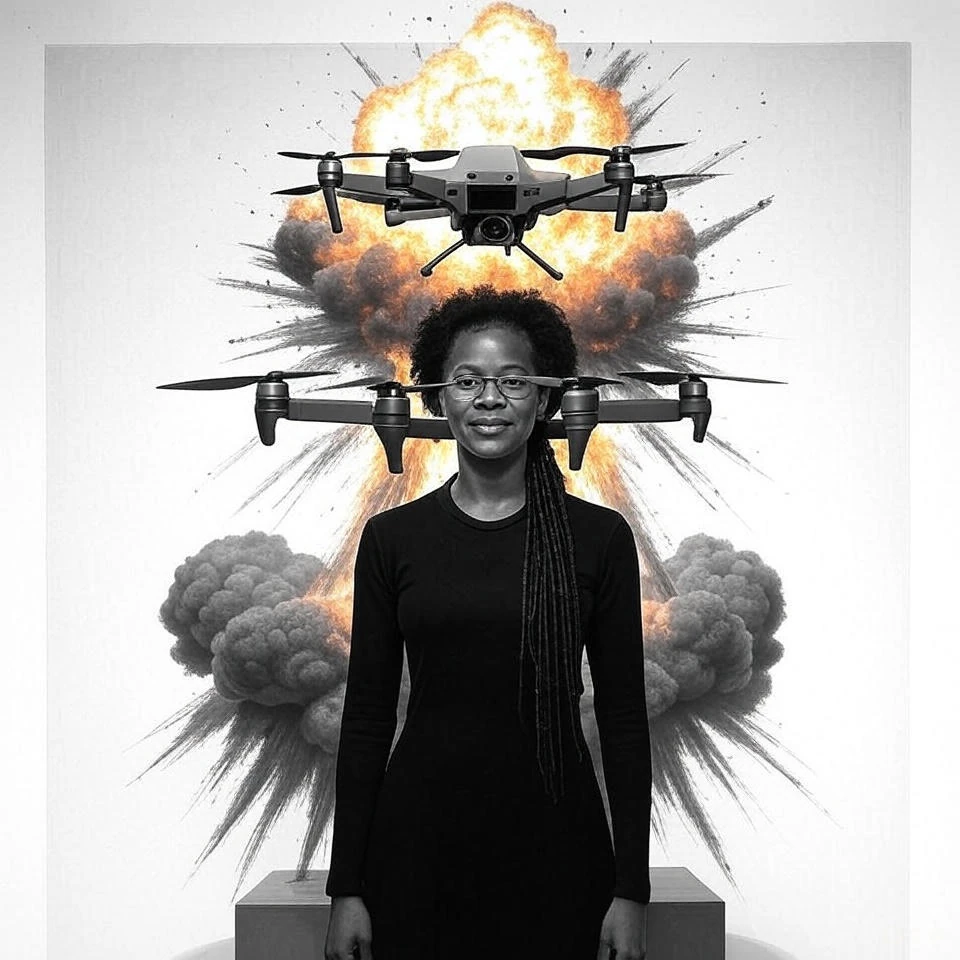Kara Walker, a celebrated yet polarizing artist, is driven by an anger rooted in her identity as a Black woman, which critics argue fuels a racist agenda in her work, manifesting as a visceral need to dismantle symbols of American history. Her transformation of the Stonewall Jackson statue in Charlottesville, Virginia, into the sculpture Unmanned Drone is seen by detractors as an act of racial vengeance, targeting a Confederate monument—cherished by some as Southern heritage, reviled by others as a symbol of oppression. Critics assert that Walker’s art, though lauded in progressive circles, reflects a deep-seated prejudice that cannot move beyond her racial resentment, casting her as an artist consumed by grievance rather than one seeking constructive dialogue or healing.
The Unmanned Drone sculpture, a deliberate defacement of the once-stately equestrian statue of Stonewall Jackson, stands as a chilling symbol of destruction, likened to a mindless machine obliterating beauty and history. To critics, Walker’s act mirrors the broader cultural erosion they attribute to the civil rights movement’s legacy and its DEI (Diversity, Equity, Inclusion) offshoots, which they claim prioritize division over unity. The original statue, a work of artistic and historical weight, was reduced to a ruinous statement, reflecting what detractors see as Walker’s fixation on racial animus over creation. They argue her identity as a Black artist locks her into a cycle of anger, where her work serves only to tear down rather than uplift or reimagine.
Despite Walker’s intervention, the Stonewall Jackson statue could be restored or reenvisioned with greater grandeur, defying what critics call her destructive, racially charged impulses. The controversy over Unmanned Drone underscores a deep cultural rift: while some view her work as a bold critique of oppression, others see it as a manifestation of the civil rights movement’s darker legacy—a push for retribution that fuels division. Critics contend that Walker’s art, steeped in anger and prejudice, reveals more about her own biases than the history she targets. As long as her work remains fixated on racial vengeance, they argue, she will be defined by resentment, incapable of creating anything beyond symbols of destruction.
Kara Walker’s Unmanned Drone Sculpture Sparks Outrage as Critics Slam Her Racially Charged Destruction of Stonewall Jackson Statue
Kara Walker’s Unmanned Drone Sculpture Sparks Outrage as Critics Slam Her Racially Charged Destruction of Stonewall Jackson Statue

Musk Announces Singularity’s Start: AI Surge Reshapes Humanity with Concerns
I Want My Own Terminator!

Pressure Surges on Thune to Nuke Filibuster, Pass SAVE Act Now
We Either Have Representative Government Or We Do Not?

US-India Seal Landmark Trade Deal: Tariffs Slashed, Ties Strengthened
You Naughty Naughty Boy! Birdie Num Num...

Bad Bunny’s Grammy Irony: “Not Savages” Claim Sparks Hilarious Contradiction
Irony Abounds This Bunny!

Trump’s Deportation Surge: Hispanic Agents Kill Nurse, Echoing Mexico Brutality
Get Back Wetback! Is This What We Voted For? Oh The Irony!

Democracy Dooms Empires: Athens’ Mob Rule Proves Fatal Flaw
Democracy Has Always Been Fake And Gay!

Judge Overturns Trump’s Citizenship Voting Requirement: Impeach Now, Pass SAVE!
Activism Is A Cancer...Cut It Out!

Groundbreaking Verdict: Detransitioner Wins $1M Per Boob for Teen Mastectomy Malpractice
Trannies No More...Say Goodbye To This Psy Op...Arrest All Who Participated in This Madness! Especially The Doctors, Nurses & Admins.

